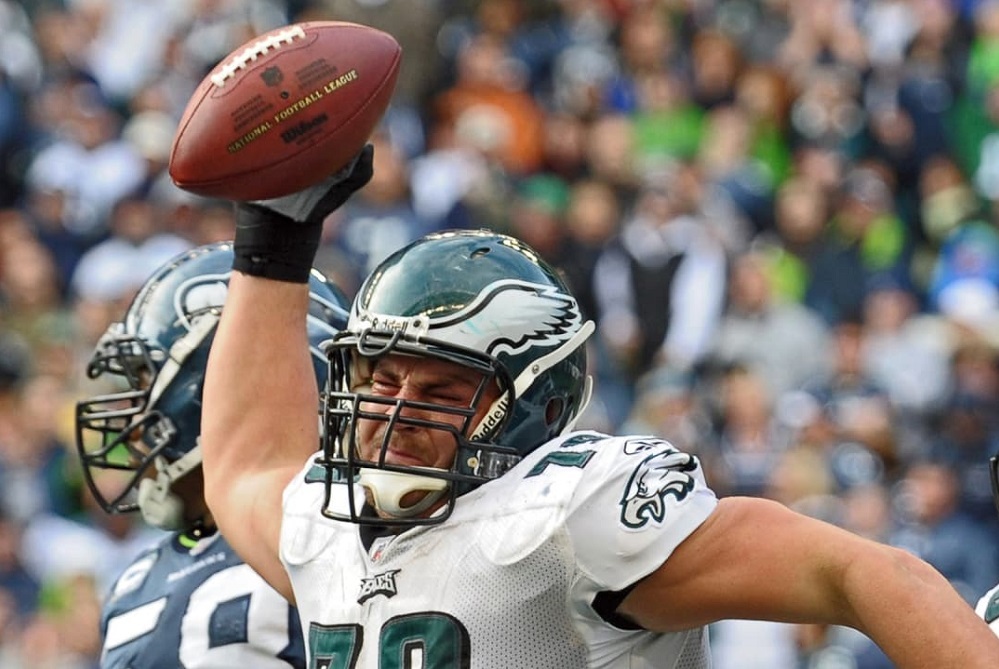
Herremans' Focus on 'Dadding,' Giving Kids Similar Small-Town Childhood
By
Tom Kendra
Special for MHSAA.com
August 5, 2021
Todd Herremans played 11 seasons in the NFL, battling big-name defensive linemen every Sunday and ascending to celebrity status in Philadelphia.
 But make no mistake: He’s still a small-town, Ravenna boy at heart.
But make no mistake: He’s still a small-town, Ravenna boy at heart.
“We lived in downtown Philly for the last 10 years and then the kids came along,” said Herremans, a 2001 graduate of Ravenna High School. “I tried to make it work, but one day it just hit me that I have no idea how to raise kids in the city.”
So, in a scene straight out of the 1960’s television comedy “Green Acres,” in January he loaded up his wife, Elizabeth, daughter Olivia (5) and son Jaxon (3) and moved to a farm in West Chester, a small town about 50 miles east of Philadelphia.
One of the goals of the move has been to provide his kids with a childhood something like his idyllic upbringing in Ravenna, a rural village in eastern Muskegon County with about 1,200 residents.
Herremans’ father, Paul, is approaching his 31st season as the varsity baseball coach at Ravenna, despite retiring as a math teacher in 2010. He has also coached football and basketball at Ravenna since the 1970s and, as a result, his sons John, Scott and Todd basically grew up under the bleachers.
“I remember being really little and I couldn’t wait to be old enough to be the bat boy,” said Todd Herremans, now 38, whose mother, Marilee, was also a teacher. “Then once I did that, I was itching to put on the pads and the uniforms. Then I couldn’t wait to be on the varsity.”
 He grew up to be a four-sport athlete at Ravenna – starring in football, basketball and baseball (along with helping out the track & field team in his senior year, throwing the discus and shot put) – and he credits playing multiple sports for helping him not only make it to the NFL, but to stay there for 11 years and remain healthy enough to start 126 of 135 career games.
He grew up to be a four-sport athlete at Ravenna – starring in football, basketball and baseball (along with helping out the track & field team in his senior year, throwing the discus and shot put) – and he credits playing multiple sports for helping him not only make it to the NFL, but to stay there for 11 years and remain healthy enough to start 126 of 135 career games.
“There’s no doubt playing other sports helped me make it to the NFL – the footwork I developed playing basketball and things like that,” said Herremans. “But it really helped me stay there. When you play different sports you are in different scenarios and fill different roles on each team. I think I was more adaptable than some of the other guys I played with.”
Herremans earned all-West Michigan Conference honors in football, basketball and baseball at Ravenna, but he was a late bloomer in many ways as his skill set grew into his big frame.
He went on to start for four years at Saginaw Valley State, playing in 48 games and starting 40 of them at left or right offensive tackle. During his senior year at Saginaw Valley he earned first-team Little All-America honors from The Associated Press, which put him firmly on the NFL radar.
He was selected in the fourth round of the 2005 NFL Draft, when the Eagles traded up to take him with Green Bay’s pick (126th overall). He started his first NFL game Nov. 27, 2005, and remained a fixture on the Eagles’ offensive front for the next decade.
Herremans, who played at 6-foot-6 and 323 pounds, was known for his consistency and durability, as well as his versatility – playing every interior line position for the Eagles except for center.
The versatility didn’t stop there, however, as he is one of the few interior offensive linemen in NFL history to catch two touchdown passes, one each in 2008 and 2010.
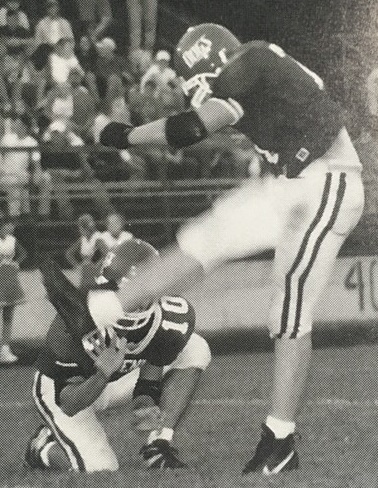
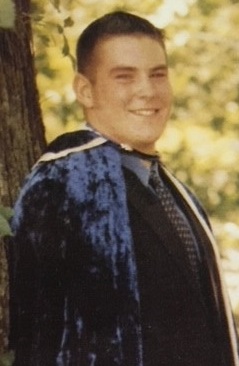
After being released by the Eagles in 2015, he was picked up right away by Indianapolis, where he started two games.
These days, Herremans spends much of his time taking care of his children at the farm in West Chester and also at his cottage on Torch Lake in northern Michigan.
“I do a lot of dadding,” he said with a laugh.
Since his retirement, Herremans and a partner started BodyChek Wellness, a company that makes hemp-based products to help with wellness, balance and recovery. He is also a member of Athletes for Care, a group that advocates for athletes on various issues of health and safety, including the use of cannabis as medicine.
He looks forward to the summer months, when he spends most of his days at his northern Michigan cottage, allowing him a perfect place and opportunity to catch up with his family and friends from both Ravenna and Saginaw Valley.
Even better is having time to watch his kids grow up, which he said would have been nearly impossible during his NFL playing days.
“I have a lot of fun being with them,” Herremans said. “Ever since we moved out to the country, my son has been obsessed with tractors and tools. I love that.”
2020-21 Made in Michigan
July 29: Loy Norrix Career Prepped Crocker for U-M Success, Law Degree Pursuit - Read
July 19: Top PGA Pro Finish Latest Greatest Highlight as Cook Continues Climb - Read
July 16: TC West Standout Renews Ties to Titans, Cheers Past Teammates' Gold Pursuit - Read
July 8: Caro Champs Find Common Ground Again as Mental Health Providers - Read
June 28: Michigan's Minor Leaguers Making Up for Lost Season - Read
PHOTOS: (Top) Past Ravenna standout Todd Herremans, here with the Philadelphia Eagles, spikes after scoring in 2008. (Middle) Herremans with wife Elizabeth and children Olivia and Jaxon. (Below) Todd’s high school memories include kicking field goals and earning the Homecoming crown. (Top photo courtesy of the Philadelphia Eagles; middle photo courtesy of the Herremans family; below photos courtesy of Ravenna High School.)
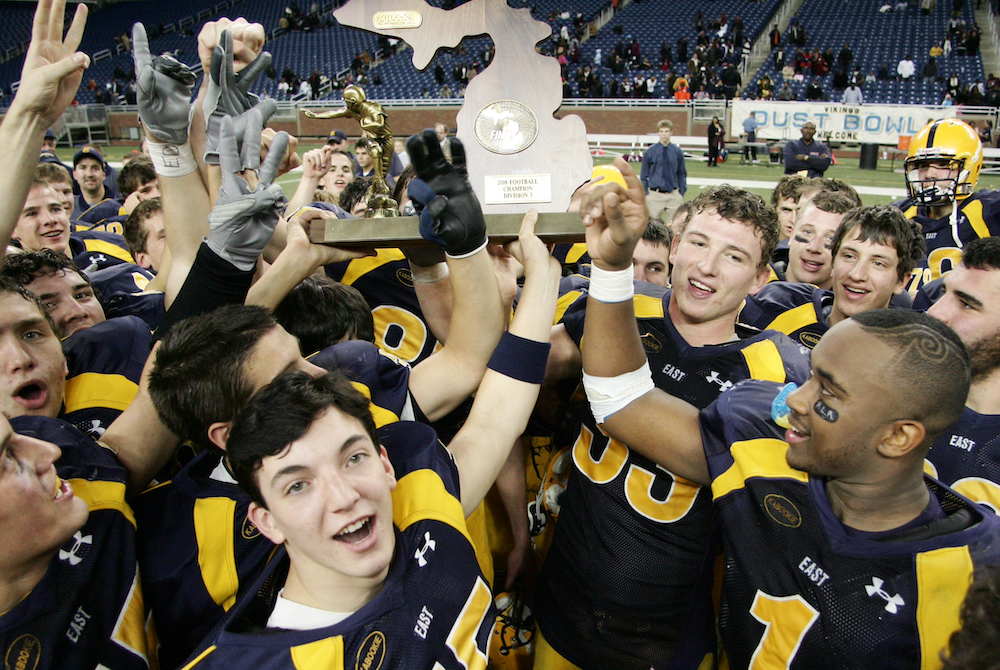
EGR 5-Year Title Run Remains Awe-Inspiring, Product of More Than Talent Alone
By
Steve Vedder
Special for MHSAA.com
November 25, 2022
It was Peter Stuursma's first year at East Grand Rapids and while the wolves weren't necessarily knocking at the door, they were definitely on the prowl.
The tradition-rich Pioneers football team had slumped to an uncharacteristic 3-6 record in Stuursma's first season as varsity head coach in 2000, and there were subtle signs a community used to winning was growing restless with the program's direction.
That's when Stuursma bumped into one of his players coming out of the weight room, and the two had a quick conversation which he clearly remembers 22 years later.
"It was this senior offensive lineman and all he said was, 'Don't worry about it Coach, it's not going to happen again. We got this,’" Stuursma said. "We had just gone 3-6, and I'm wondering how we're going to get this going and that they might get rid of me. You never underestimate what people can do."
East Grand Rapids, under legendary coach George Barcheski, had been the dominant football program in West Michigan with 28 winning seasons over 29 from 1970-99, and 38 victories in 39 games from 1993-95, along with Class B championships in 1976 and 1983. After Stuursma replaced the retiring Barcheski,, some in the community were expecting more of the same when it came to success.
Those fans never dreamed what they would see as the Pioneers promptly pieced together arguably the greatest decade-long stretch in Michigan high school football history – and without doubt one of the most incredible five-year runs of dominance.
Even that optimistic offensive lineman couldn't have imagined a remarkable 126-7 record over the next 11 years, a 40-3 MHSAA Tournament mark and seven Finals championships. Five of those titles (2006-10) came in a row, a feat accomplished just three times in the now 46-year history of the playoffs.
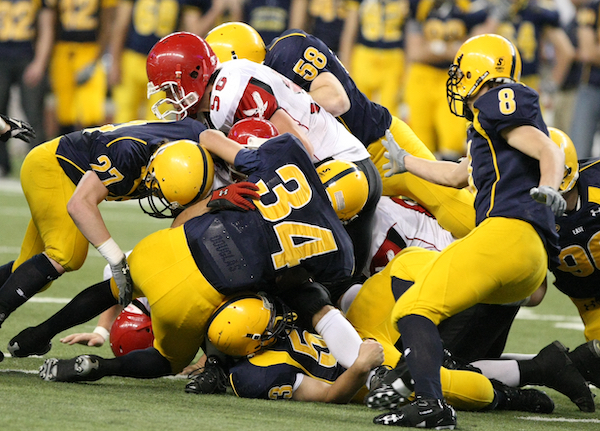 The five straight championships were part of an amazing era that Stuursma and his players say has not diminished with time. They recall no single factor explained going 67-3 overall over those five seasons. There was talent, obviously, but coaching, tradition, confidence and strength of community all played vital parts. There were Thanksgiving practices attended by hundreds of former football alumni, dedicated fan support that included playing before more than 30,000 fans at least twice at Ford Field, and a program-wide attitude that, while some may call it a cliché, proved that success did indeed breed success.
The five straight championships were part of an amazing era that Stuursma and his players say has not diminished with time. They recall no single factor explained going 67-3 overall over those five seasons. There was talent, obviously, but coaching, tradition, confidence and strength of community all played vital parts. There were Thanksgiving practices attended by hundreds of former football alumni, dedicated fan support that included playing before more than 30,000 fans at least twice at Ford Field, and a program-wide attitude that, while some may call it a cliché, proved that success did indeed breed success.
"I'm in awe of the scope of things," said Stuursma, whose team used back-to-back Division 3 championships in 2002-03 as a springboard to later success. "Because we had won a couple times before it just started to feel normal. We had such support the community used to think Thanksgiving break ended at Ford Field."
EGR teams would find all kinds of ways to win during the five-year title stretch. The 2009 team, for instance, barreled through its first four playoff opponents by a combined score of 164-29 until a 24-21 win over Orchard Lake St. Mary’s in the Final. The 2010 team had to win three playoff games by eight points or fewer to finish off its perfect 14-0 record. And then there was the wild 46-39 five-overtime win over St. Mary's in the 2007 Final during which the Pioneers had to score on all five possessions in overtime to outlast the Eaglets.
While teams always seemed to find ways to get the victory, former players remember what it was like to be part of a seemingly endless tradition of success on the football field.
"One of the things that was so special about East Grand Rapids were the expectations," said Luke Glendening, a running back on the 2006 team who has gone on to a long NHL career with the Detroit Red Wings and Dallas Stars. "During the game I'd look around and see guys who had played here a long time ago. I viewed it as a privilege to have the opportunity to play before the alumni and community."
Quarterback Ryan Elble, who completed a combined 34 passes for 483 yards and seven touchdowns during the 2008 and 2009 Finals, also used the word "honored" to describe his high school experience.
"The culture was to win. Coach Stuursma made it fun, and it always seemed to take shape on the field," said Elble, who went on to play baseball at Miami (Ohio) "I think each team had different skill sets, but at the end of the day it was our culture and putting in the work to spend Thanksgiving weekend at Ford Field."
The players point to that winning culture over talent. Elble said he played with only one eventual Division I college player in linebacker/running back Trent Voss, who went on to Toledo. Nobody wins without talent, of course, but they point to many other factors as being just as critical. Because EGR coaches would always work juniors into the lineup, Stuursma said the program faced only one major rebuild, in 2007. That team wound up 13-1 and the second of those five straight champions.
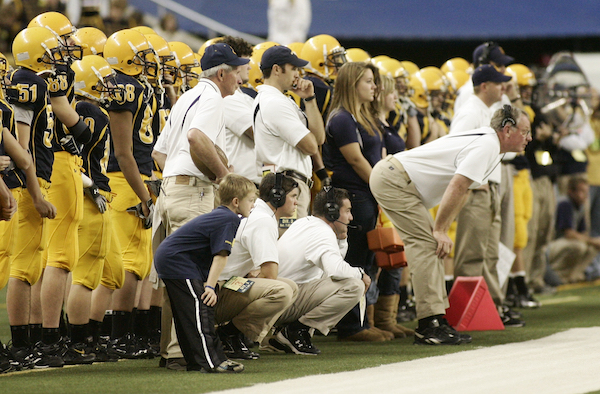 "We had some incredible players," said Stuursma, who left EGR in 2016 to lead Hope College to two Michigan Intercollegiate Athletic Association titles, three second-place finishes and a 46-15 overall record over his seven seasons. "We returned only two starters (in 2007), but we still had good guys who wanted to win."
"We had some incredible players," said Stuursma, who left EGR in 2016 to lead Hope College to two Michigan Intercollegiate Athletic Association titles, three second-place finishes and a 46-15 overall record over his seven seasons. "We returned only two starters (in 2007), but we still had good guys who wanted to win."
The players say the culture started with Barcheski and the program's tradition. As Hope College's coach, Stuursma said there’s a similar common thread among schools he sees on recruiting visits: a winning tradition that, in Stuursma's words "screams excellence," from every corner of the building. He sees it the minute he walks into some schools, and East Grand Rapids had the same culture before he arrived. The past players say it played a major part in their careers.
That tradition didn't start with the five straight titles, said former quarterback Kyle Cunningham, who played on the 2002-03 teams and went 46-0 over four years from his freshman to senior seasons. Those two championship teams’ most recognizable player was running back Kevin Grady, who still holds multiple MHSAA records including for career rush yardage and went on to play at University of Michigan.
"We worked hard and had a lot of pride," he said. "I remember watching film of earlier teams, and I remember hoping our team could stand up the same way."
While the players point to tradition and community, Ryan Blair, a tight end/defensive tackle on the 2006-08 champion clubs, said talent remained critical – but EGR was outmanned physically in some of those title games. That's when camaraderie and the confidence that someone was going to make a key play took over. The Pioneers' remarkable run was teeming with such plays.
"Certainly we were never one of the biggest teams there, we never had a big size advantage in any game," he said. "But we had this camaraderie on every team. We had guys who really liked playing with each other. When things got tight we stuck together, and we'd fight to the fourth quarter or beyond."
Despite the long odds of winning a single state title let alone repeating, Stuursma believes there could be a team one day which wins six straight. That team will have the same characteristics of those EGR teams – the talent, coaching, tradition and fortune of catching timely breaks – but it can be done, he said.
"Absolutely," Stuursma said. "The only record I can think of that won't be broken is Wayne Gretzky's (NHL) scoring record. It will take a lot, but records are made to be broken. I think high school football is on the upswing and there would have to be an emphasis on winning. You would have to have a good path to get there, but I can see someone getting six one day."
PHOTOS (Top) East Grand Rapids celebrates its third-straight Division 3 championship win in 2008. (Middle) Pioneers converge on an Orchard Lake St. Mary’s ball carrier during the 2007 five-overtime title decider. (Below) EGR coach Peter Stuursma, kneeling center, monitors the action during the 2010 championship game.

